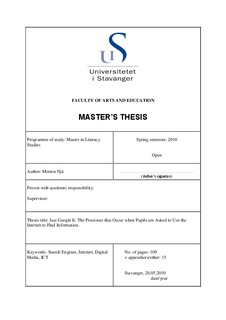| dc.description.abstract | This thesis observes the processes that occur when pupils are told to use the Internet to find information for a specific school-related task. The term Information Literacy encapsulates these processes well, and put them into two main groups: An information literate person must be able to use modern technology to find relevant information, but must also know how to evaluate this information. These two elements form the basis for the research questions. The first question examines how the pupils use the Internet to find information, which includes the search engine they use, how many searches they make, and which search engine results they click on. The second question focuses on how the pupils evaluate the information they find, including how much they trust various websites, and which strategies they use to determine the credibility of a source.
A total of 36 pupils, including 17 boys and 19 girls, took part in a quantitative study that forms the basis for this thesis. Each pupil were handed a task to complete in 45 minutes. The results are based on data from two different sources. The first source of data was collected from screen recordings of the pupils’ activities when surfing the web for information, while the second source was gathered from a questionnaire that the pupils filled out after completing the task.
The results show that the pupils only used Google’s search engine, and that most of them used Wikipedia articles as one of their sources. On average, the pupils made 2.91 searches, clicked on a link on most result pages (81.7%), and preferred the top result (32.8%). There was also a pattern of start-up sequences that most pupils went through. These sequences resulted in that 87% of the pupils ended up at a Google search page within the first few minutes. The pupils trusted online news, but had little trust in blogs and gossip magazines. They displayed awareness on several factors that determine credibility. The pupils also displayed a high trust in authority websites. The thesis concludes that the pupils are fairly information literate, but they may benefit from adopting different strategies and check alternative sources, and also be critical to sources that they perceive as authoritative. | en_US |
